CHC50113 Integrated Workplace Assessment: Child Study Part 4
VerifiedAdded on 2023/06/10
|161
|24310
|313
Practical Assignment
AI Summary
This CHC50113 Integrated Workplace Assessment task focuses on child study within an early childhood education setting. It requires the student to conduct observations, gather information, and analyze a focus child aged between 2-6 years, utilizing approved learning frameworks such as the Early Years Learning Framework. The assessment includes pre-activities involving required readings from textbooks and core documents related to child development and learning. The student must obtain parental permission, collaborate with a workplace supervisor, and complete observation documentation over time to inform curriculum design and implementation that fosters the child’s learning and development. The task also emphasizes the importance of authenticity and requires declarations from both the student and supervisor.
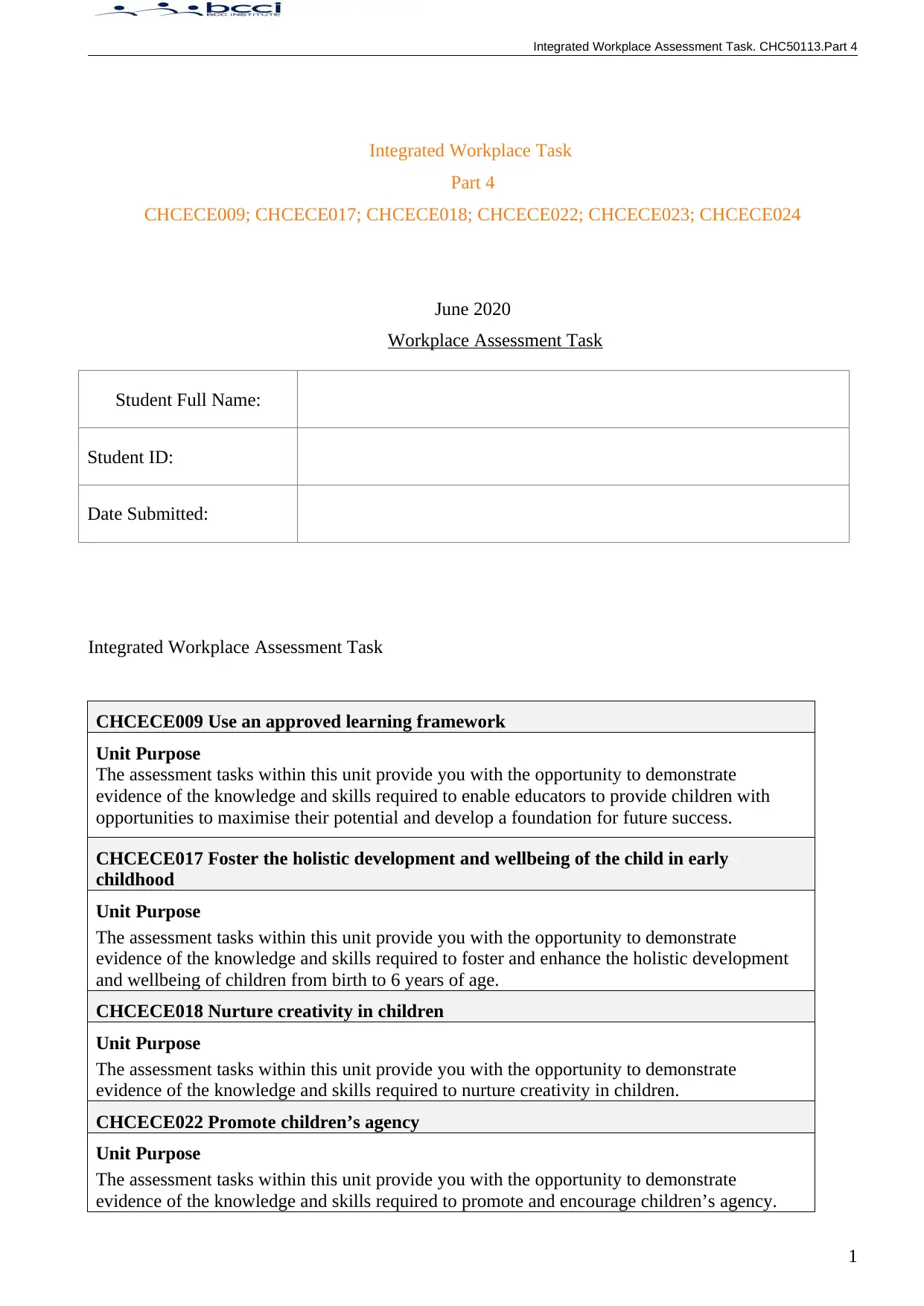
Integrated Workplace Assessment Task. CHC50113.Part 4
Integrated Workplace Task
Part 4
CHCECE009; CHCECE017; CHCECE018; CHCECE022; CHCECE023; CHCECE024
June 2020
Workplace Assessment Task
Student Full Name:
Student ID:
Date Submitted:
Integrated Workplace Assessment Task
CHCECE009 Use an approved learning framework
Unit Purpose
The assessment tasks within this unit provide you with the opportunity to demonstrate
evidence of the knowledge and skills required to enable educators to provide children with
opportunities to maximise their potential and develop a foundation for future success.
CHCECE017 Foster the holistic development and wellbeing of the child in early
childhood
Unit Purpose
The assessment tasks within this unit provide you with the opportunity to demonstrate
evidence of the knowledge and skills required to foster and enhance the holistic development
and wellbeing of children from birth to 6 years of age.
CHCECE018 Nurture creativity in children
Unit Purpose
The assessment tasks within this unit provide you with the opportunity to demonstrate
evidence of the knowledge and skills required to nurture creativity in children.
CHCECE022 Promote children’s agency
Unit Purpose
The assessment tasks within this unit provide you with the opportunity to demonstrate
evidence of the knowledge and skills required to promote and encourage children’s agency.
1
Integrated Workplace Task
Part 4
CHCECE009; CHCECE017; CHCECE018; CHCECE022; CHCECE023; CHCECE024
June 2020
Workplace Assessment Task
Student Full Name:
Student ID:
Date Submitted:
Integrated Workplace Assessment Task
CHCECE009 Use an approved learning framework
Unit Purpose
The assessment tasks within this unit provide you with the opportunity to demonstrate
evidence of the knowledge and skills required to enable educators to provide children with
opportunities to maximise their potential and develop a foundation for future success.
CHCECE017 Foster the holistic development and wellbeing of the child in early
childhood
Unit Purpose
The assessment tasks within this unit provide you with the opportunity to demonstrate
evidence of the knowledge and skills required to foster and enhance the holistic development
and wellbeing of children from birth to 6 years of age.
CHCECE018 Nurture creativity in children
Unit Purpose
The assessment tasks within this unit provide you with the opportunity to demonstrate
evidence of the knowledge and skills required to nurture creativity in children.
CHCECE022 Promote children’s agency
Unit Purpose
The assessment tasks within this unit provide you with the opportunity to demonstrate
evidence of the knowledge and skills required to promote and encourage children’s agency.
1
Paraphrase This Document
Need a fresh take? Get an instant paraphrase of this document with our AI Paraphraser
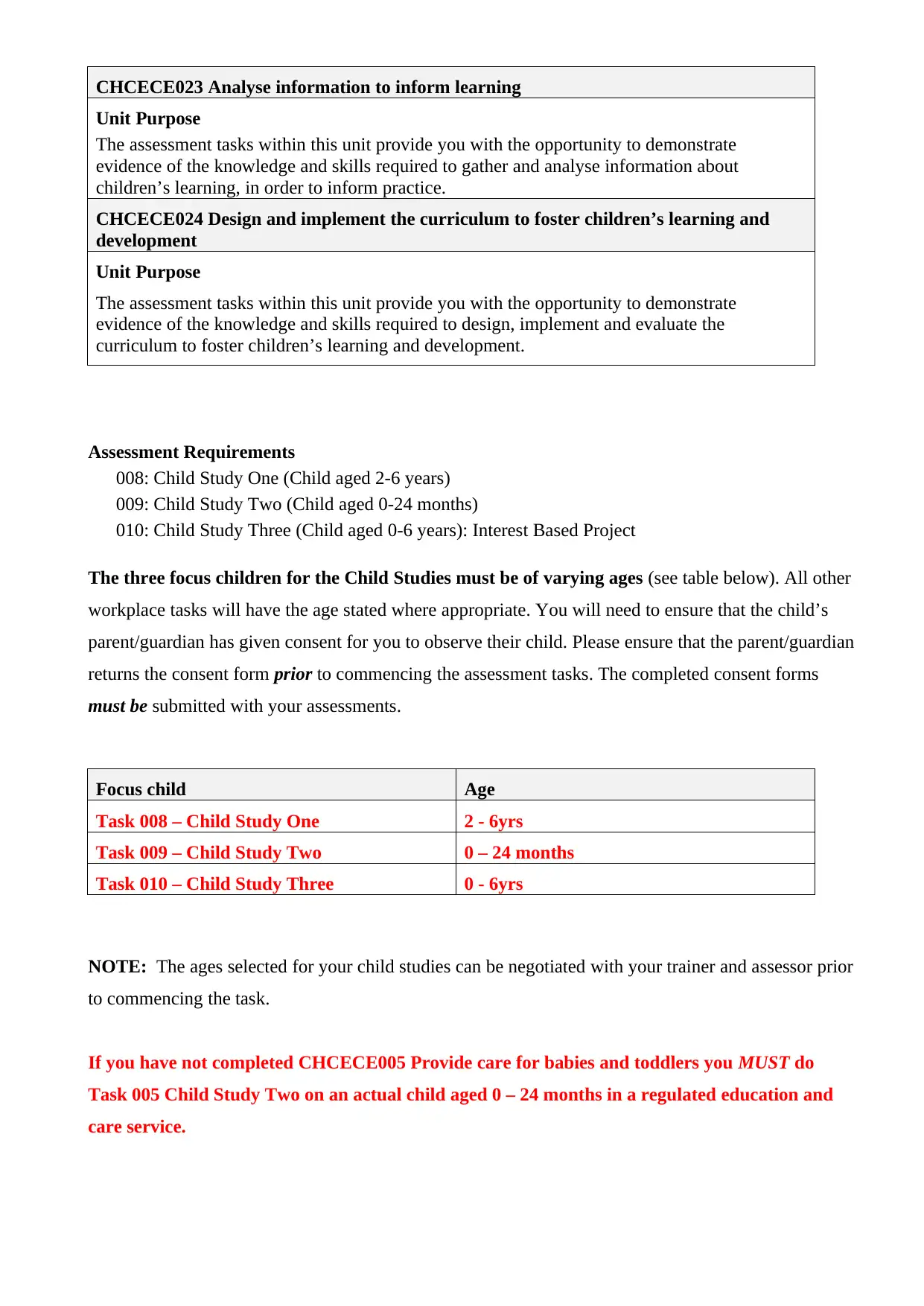
CHCECE023 Analyse information to inform learning
Unit Purpose
The assessment tasks within this unit provide you with the opportunity to demonstrate
evidence of the knowledge and skills required to gather and analyse information about
children’s learning, in order to inform practice.
CHCECE024 Design and implement the curriculum to foster children’s learning and
development
Unit Purpose
The assessment tasks within this unit provide you with the opportunity to demonstrate
evidence of the knowledge and skills required to design, implement and evaluate the
curriculum to foster children’s learning and development.
Assessment Requirements
008: Child Study One (Child aged 2-6 years)
009: Child Study Two (Child aged 0-24 months)
010: Child Study Three (Child aged 0-6 years): Interest Based Project
The three focus children for the Child Studies must be of varying ages (see table below). All other
workplace tasks will have the age stated where appropriate. You will need to ensure that the child’s
parent/guardian has given consent for you to observe their child. Please ensure that the parent/guardian
returns the consent form prior to commencing the assessment tasks. The completed consent forms
must be submitted with your assessments.
Focus child Age
Task 008 – Child Study One 2 - 6yrs
Task 009 – Child Study Two 0 – 24 months
Task 010 – Child Study Three 0 - 6yrs
NOTE: The ages selected for your child studies can be negotiated with your trainer and assessor prior
to commencing the task.
If you have not completed CHCECE005 Provide care for babies and toddlers you MUST do
Task 005 Child Study Two on an actual child aged 0 – 24 months in a regulated education and
care service.
Unit Purpose
The assessment tasks within this unit provide you with the opportunity to demonstrate
evidence of the knowledge and skills required to gather and analyse information about
children’s learning, in order to inform practice.
CHCECE024 Design and implement the curriculum to foster children’s learning and
development
Unit Purpose
The assessment tasks within this unit provide you with the opportunity to demonstrate
evidence of the knowledge and skills required to design, implement and evaluate the
curriculum to foster children’s learning and development.
Assessment Requirements
008: Child Study One (Child aged 2-6 years)
009: Child Study Two (Child aged 0-24 months)
010: Child Study Three (Child aged 0-6 years): Interest Based Project
The three focus children for the Child Studies must be of varying ages (see table below). All other
workplace tasks will have the age stated where appropriate. You will need to ensure that the child’s
parent/guardian has given consent for you to observe their child. Please ensure that the parent/guardian
returns the consent form prior to commencing the assessment tasks. The completed consent forms
must be submitted with your assessments.
Focus child Age
Task 008 – Child Study One 2 - 6yrs
Task 009 – Child Study Two 0 – 24 months
Task 010 – Child Study Three 0 - 6yrs
NOTE: The ages selected for your child studies can be negotiated with your trainer and assessor prior
to commencing the task.
If you have not completed CHCECE005 Provide care for babies and toddlers you MUST do
Task 005 Child Study Two on an actual child aged 0 – 24 months in a regulated education and
care service.
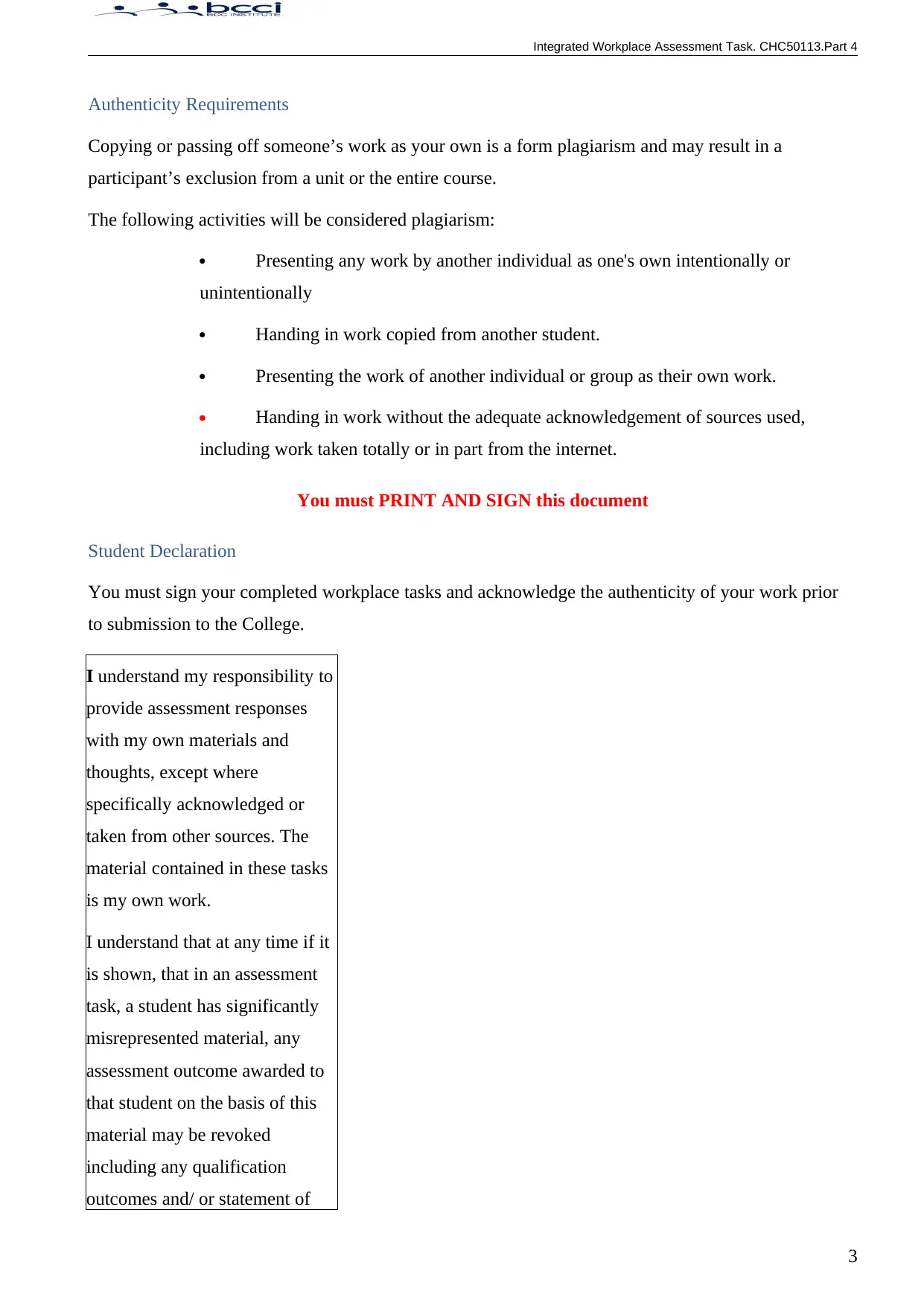
Integrated Workplace Assessment Task. CHC50113.Part 4
Authenticity Requirements
Copying or passing off someone’s work as your own is a form plagiarism and may result in a
participant’s exclusion from a unit or the entire course.
The following activities will be considered plagiarism:
Presenting any work by another individual as one's own intentionally or
unintentionally
Handing in work copied from another student.
Presenting the work of another individual or group as their own work.
Handing in work without the adequate acknowledgement of sources used,
including work taken totally or in part from the internet.
You must PRINT AND SIGN this document
Student Declaration
You must sign your completed workplace tasks and acknowledge the authenticity of your work prior
to submission to the College.
I understand my responsibility to
provide assessment responses
with my own materials and
thoughts, except where
specifically acknowledged or
taken from other sources. The
material contained in these tasks
is my own work.
I understand that at any time if it
is shown, that in an assessment
task, a student has significantly
misrepresented material, any
assessment outcome awarded to
that student on the basis of this
material may be revoked
including any qualification
outcomes and/ or statement of
3
Authenticity Requirements
Copying or passing off someone’s work as your own is a form plagiarism and may result in a
participant’s exclusion from a unit or the entire course.
The following activities will be considered plagiarism:
Presenting any work by another individual as one's own intentionally or
unintentionally
Handing in work copied from another student.
Presenting the work of another individual or group as their own work.
Handing in work without the adequate acknowledgement of sources used,
including work taken totally or in part from the internet.
You must PRINT AND SIGN this document
Student Declaration
You must sign your completed workplace tasks and acknowledge the authenticity of your work prior
to submission to the College.
I understand my responsibility to
provide assessment responses
with my own materials and
thoughts, except where
specifically acknowledged or
taken from other sources. The
material contained in these tasks
is my own work.
I understand that at any time if it
is shown, that in an assessment
task, a student has significantly
misrepresented material, any
assessment outcome awarded to
that student on the basis of this
material may be revoked
including any qualification
outcomes and/ or statement of
3
⊘ This is a preview!⊘
Do you want full access?
Subscribe today to unlock all pages.

Trusted by 1+ million students worldwide
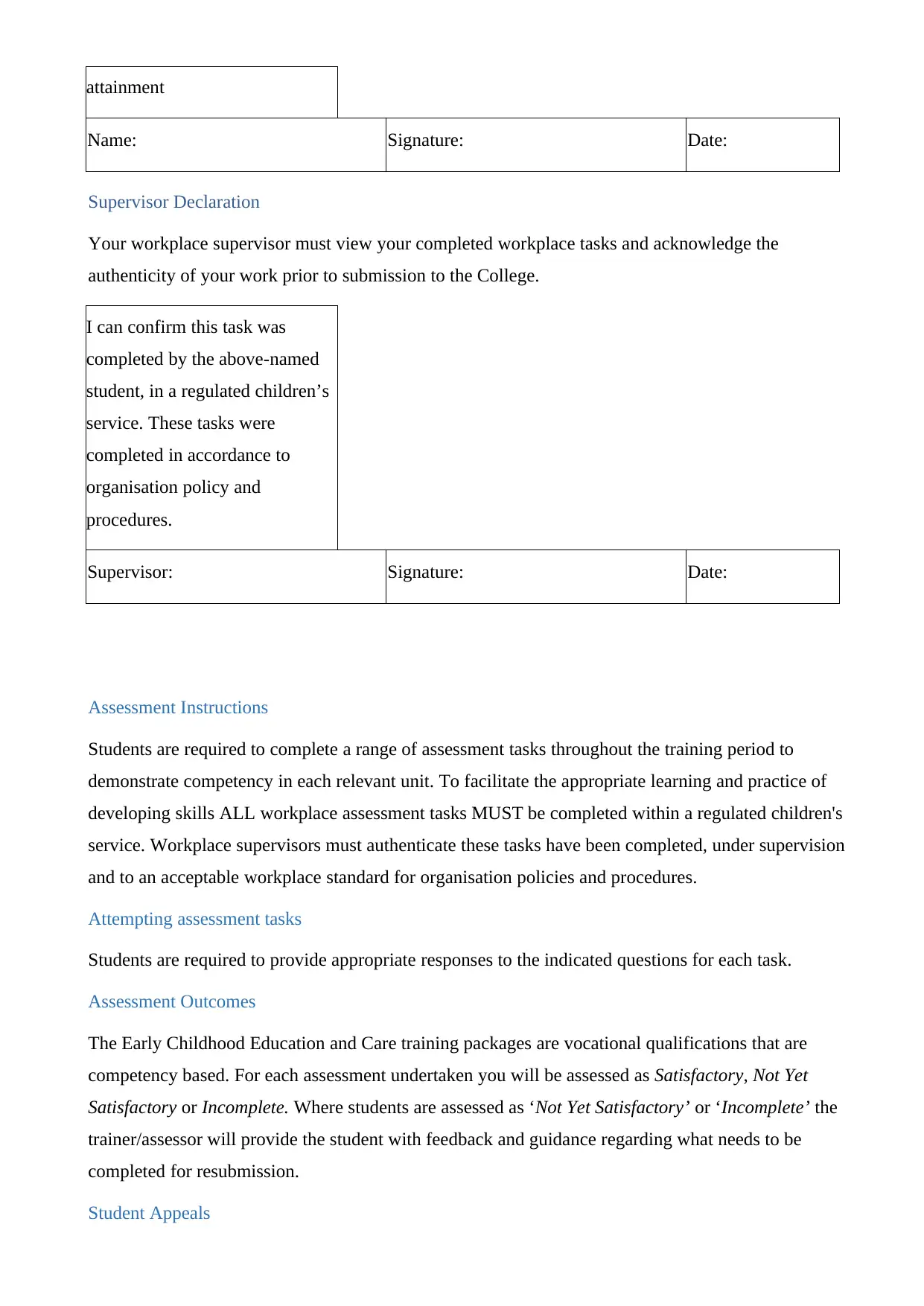
attainment
Name: Signature: Date:
Supervisor Declaration
Your workplace supervisor must view your completed workplace tasks and acknowledge the
authenticity of your work prior to submission to the College.
I can confirm this task was
completed by the above-named
student, in a regulated children’s
service. These tasks were
completed in accordance to
organisation policy and
procedures.
Supervisor: Signature: Date:
Assessment Instructions
Students are required to complete a range of assessment tasks throughout the training period to
demonstrate competency in each relevant unit. To facilitate the appropriate learning and practice of
developing skills ALL workplace assessment tasks MUST be completed within a regulated children's
service. Workplace supervisors must authenticate these tasks have been completed, under supervision
and to an acceptable workplace standard for organisation policies and procedures.
Attempting assessment tasks
Students are required to provide appropriate responses to the indicated questions for each task.
Assessment Outcomes
The Early Childhood Education and Care training packages are vocational qualifications that are
competency based. For each assessment undertaken you will be assessed as Satisfactory, Not Yet
Satisfactory or Incomplete. Where students are assessed as ‘Not Yet Satisfactory’ or ‘Incomplete’ the
trainer/assessor will provide the student with feedback and guidance regarding what needs to be
completed for resubmission.
Student Appeals
Name: Signature: Date:
Supervisor Declaration
Your workplace supervisor must view your completed workplace tasks and acknowledge the
authenticity of your work prior to submission to the College.
I can confirm this task was
completed by the above-named
student, in a regulated children’s
service. These tasks were
completed in accordance to
organisation policy and
procedures.
Supervisor: Signature: Date:
Assessment Instructions
Students are required to complete a range of assessment tasks throughout the training period to
demonstrate competency in each relevant unit. To facilitate the appropriate learning and practice of
developing skills ALL workplace assessment tasks MUST be completed within a regulated children's
service. Workplace supervisors must authenticate these tasks have been completed, under supervision
and to an acceptable workplace standard for organisation policies and procedures.
Attempting assessment tasks
Students are required to provide appropriate responses to the indicated questions for each task.
Assessment Outcomes
The Early Childhood Education and Care training packages are vocational qualifications that are
competency based. For each assessment undertaken you will be assessed as Satisfactory, Not Yet
Satisfactory or Incomplete. Where students are assessed as ‘Not Yet Satisfactory’ or ‘Incomplete’ the
trainer/assessor will provide the student with feedback and guidance regarding what needs to be
completed for resubmission.
Student Appeals
Paraphrase This Document
Need a fresh take? Get an instant paraphrase of this document with our AI Paraphraser
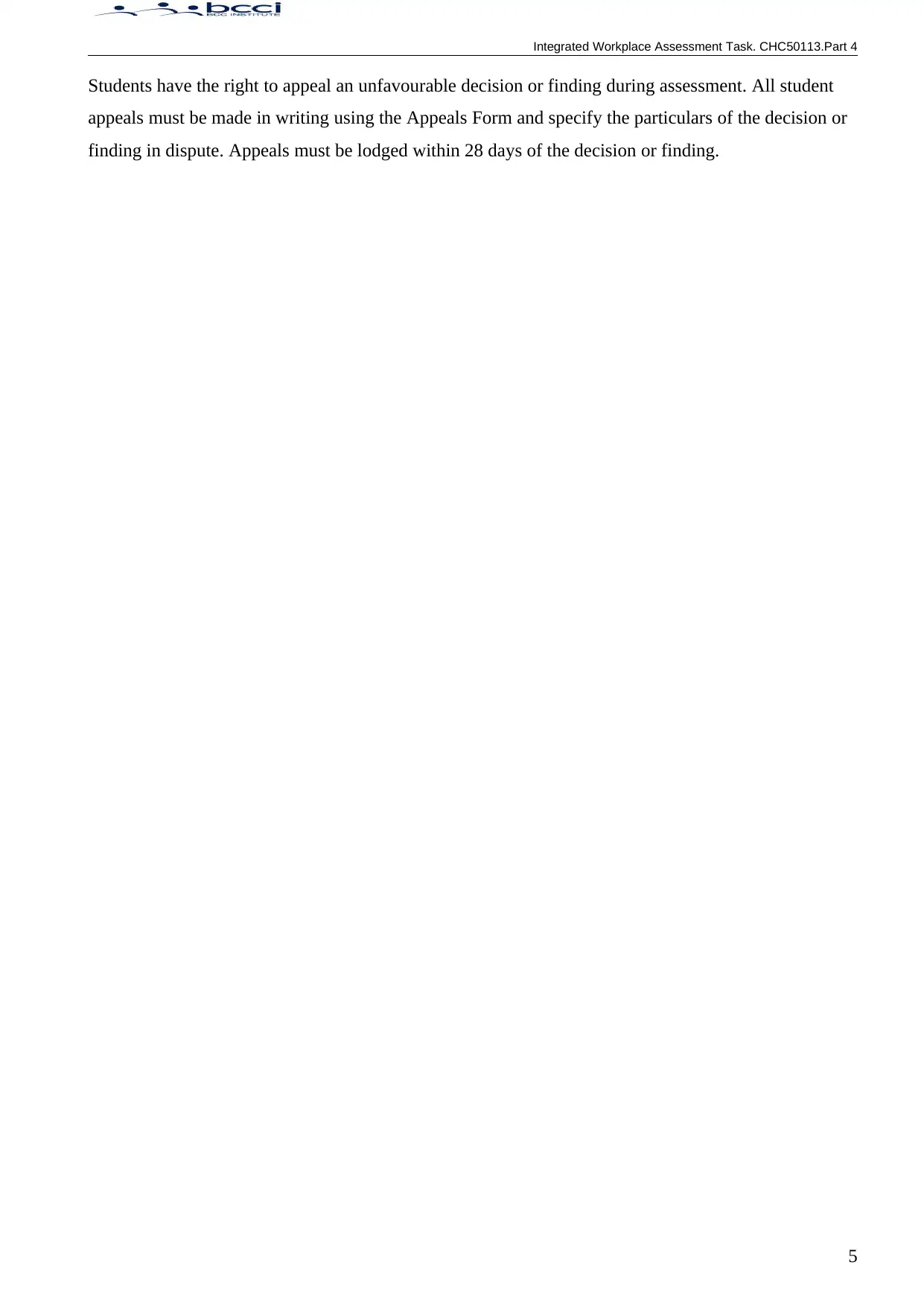
Integrated Workplace Assessment Task. CHC50113.Part 4
Students have the right to appeal an unfavourable decision or finding during assessment. All student
appeals must be made in writing using the Appeals Form and specify the particulars of the decision or
finding in dispute. Appeals must be lodged within 28 days of the decision or finding.
5
Students have the right to appeal an unfavourable decision or finding during assessment. All student
appeals must be made in writing using the Appeals Form and specify the particulars of the decision or
finding in dispute. Appeals must be lodged within 28 days of the decision or finding.
5
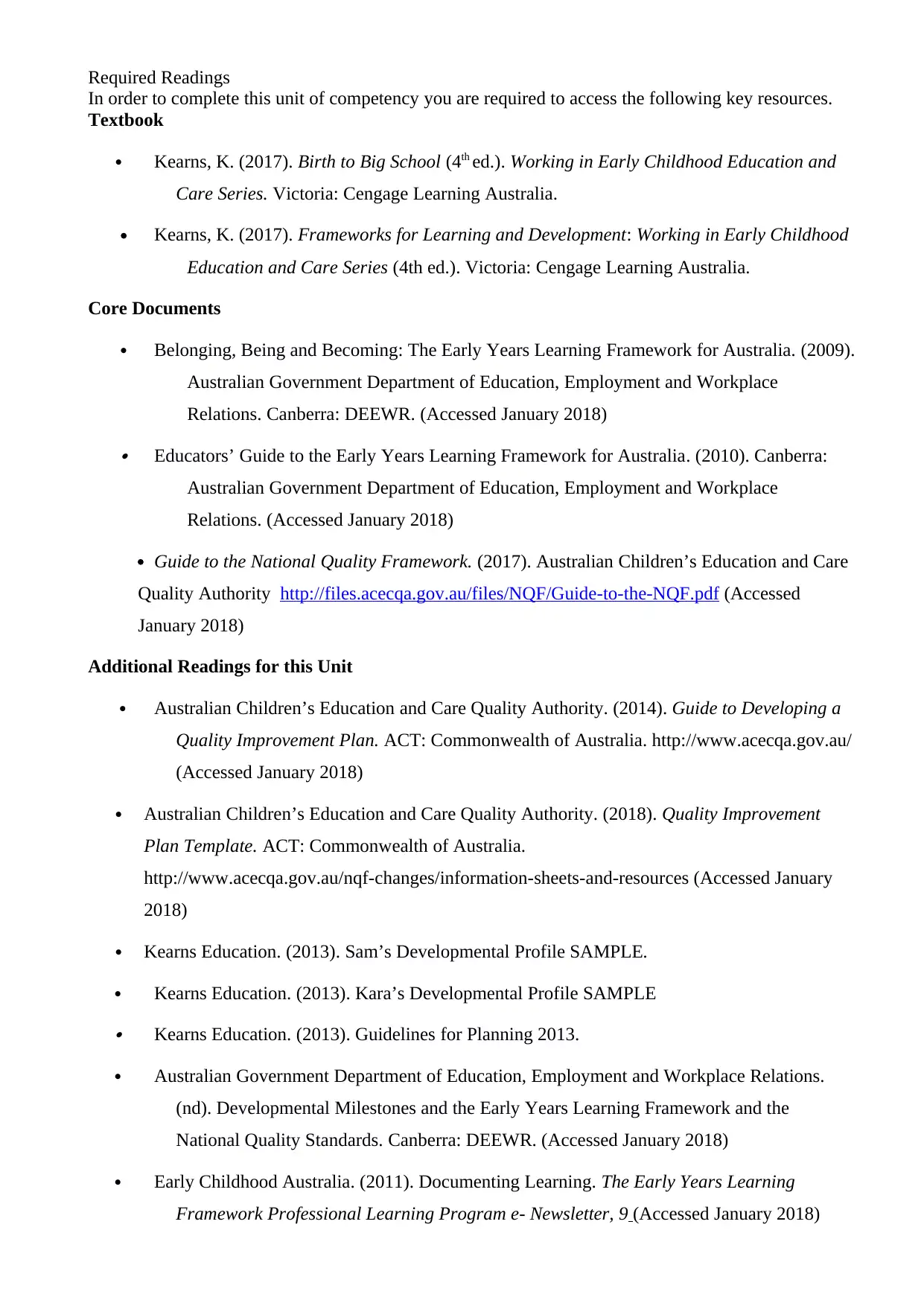
Required Readings
In order to complete this unit of competency you are required to access the following key resources.
Textbook
Kearns, K. (2017). Birth to Big School (4th ed.). Working in Early Childhood Education and
Care Series. Victoria: Cengage Learning Australia.
Kearns, K. (2017). Frameworks for Learning and Development: Working in Early Childhood
Education and Care Series (4th ed.). Victoria: Cengage Learning Australia.
Core Documents
Belonging, Being and Becoming: The Early Years Learning Framework for Australia. (2009).
Australian Government Department of Education, Employment and Workplace
Relations. Canberra: DEEWR. (Accessed January 2018) Educators’ Guide to the Early Years Learning Framework for Australia. (2010). Canberra:
Australian Government Department of Education, Employment and Workplace
Relations. (Accessed January 2018)
Guide to the National Quality Framework. (2017). Australian Children’s Education and Care
Quality Authority http://files.acecqa.gov.au/files/NQF/Guide-to-the-NQF.pdf (Accessed
January 2018)
Additional Readings for this Unit
Australian Children’s Education and Care Quality Authority. (2014). Guide to Developing a
Quality Improvement Plan. ACT: Commonwealth of Australia. http://www.acecqa.gov.au/
(Accessed January 2018)
Australian Children’s Education and Care Quality Authority. (2018). Quality Improvement
Plan Template. ACT: Commonwealth of Australia.
http://www.acecqa.gov.au/nqf-changes/information-sheets-and-resources (Accessed January
2018)
Kearns Education. (2013). Sam’s Developmental Profile SAMPLE.
Kearns Education. (2013). Kara’s Developmental Profile SAMPLE
Kearns Education. (2013). Guidelines for Planning 2013.
Australian Government Department of Education, Employment and Workplace Relations.
(nd). Developmental Milestones and the Early Years Learning Framework and the
National Quality Standards. Canberra: DEEWR. (Accessed January 2018)
Early Childhood Australia. (2011). Documenting Learning. The Early Years Learning
Framework Professional Learning Program e- Newsletter, 9 (Accessed January 2018)
In order to complete this unit of competency you are required to access the following key resources.
Textbook
Kearns, K. (2017). Birth to Big School (4th ed.). Working in Early Childhood Education and
Care Series. Victoria: Cengage Learning Australia.
Kearns, K. (2017). Frameworks for Learning and Development: Working in Early Childhood
Education and Care Series (4th ed.). Victoria: Cengage Learning Australia.
Core Documents
Belonging, Being and Becoming: The Early Years Learning Framework for Australia. (2009).
Australian Government Department of Education, Employment and Workplace
Relations. Canberra: DEEWR. (Accessed January 2018) Educators’ Guide to the Early Years Learning Framework for Australia. (2010). Canberra:
Australian Government Department of Education, Employment and Workplace
Relations. (Accessed January 2018)
Guide to the National Quality Framework. (2017). Australian Children’s Education and Care
Quality Authority http://files.acecqa.gov.au/files/NQF/Guide-to-the-NQF.pdf (Accessed
January 2018)
Additional Readings for this Unit
Australian Children’s Education and Care Quality Authority. (2014). Guide to Developing a
Quality Improvement Plan. ACT: Commonwealth of Australia. http://www.acecqa.gov.au/
(Accessed January 2018)
Australian Children’s Education and Care Quality Authority. (2018). Quality Improvement
Plan Template. ACT: Commonwealth of Australia.
http://www.acecqa.gov.au/nqf-changes/information-sheets-and-resources (Accessed January
2018)
Kearns Education. (2013). Sam’s Developmental Profile SAMPLE.
Kearns Education. (2013). Kara’s Developmental Profile SAMPLE
Kearns Education. (2013). Guidelines for Planning 2013.
Australian Government Department of Education, Employment and Workplace Relations.
(nd). Developmental Milestones and the Early Years Learning Framework and the
National Quality Standards. Canberra: DEEWR. (Accessed January 2018)
Early Childhood Australia. (2011). Documenting Learning. The Early Years Learning
Framework Professional Learning Program e- Newsletter, 9 (Accessed January 2018)
⊘ This is a preview!⊘
Do you want full access?
Subscribe today to unlock all pages.

Trusted by 1+ million students worldwide
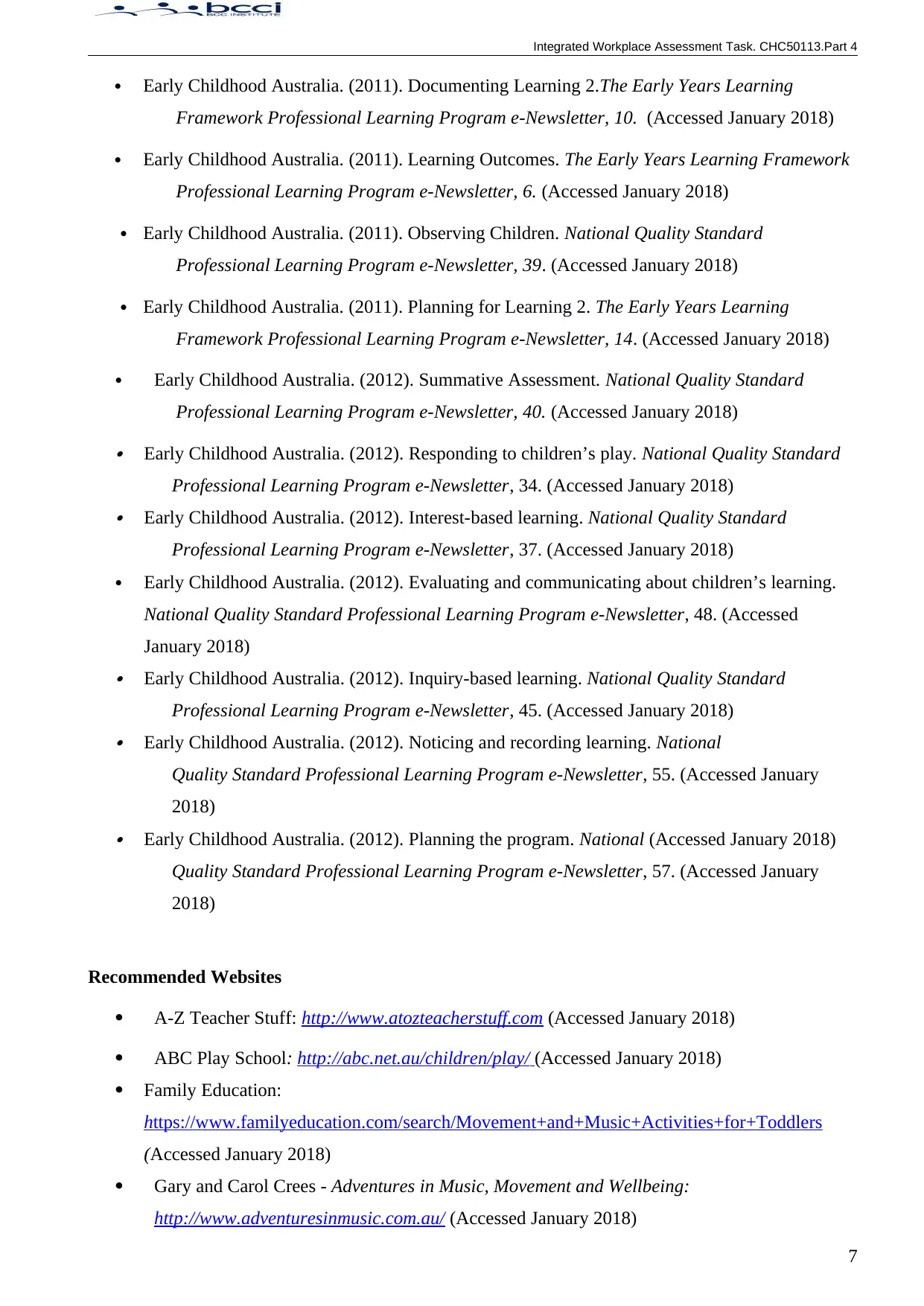
Integrated Workplace Assessment Task. CHC50113.Part 4
Early Childhood Australia. (2011). Documenting Learning 2.The Early Years Learning
Framework Professional Learning Program e-Newsletter, 10. (Accessed January 2018)
Early Childhood Australia. (2011). Learning Outcomes. The Early Years Learning Framework
Professional Learning Program e-Newsletter, 6. (Accessed January 2018)
Early Childhood Australia. (2011). Observing Children. National Quality Standard
Professional Learning Program e-Newsletter, 39. (Accessed January 2018)
Early Childhood Australia. (2011). Planning for Learning 2. The Early Years Learning
Framework Professional Learning Program e-Newsletter, 14. (Accessed January 2018)
Early Childhood Australia. (2012). Summative Assessment. National Quality Standard
Professional Learning Program e-Newsletter, 40. (Accessed January 2018)
Early Childhood Australia. (2012). Responding to children’s play. National Quality Standard
Professional Learning Program e-Newsletter, 34. (Accessed January 2018) Early Childhood Australia. (2012). Interest-based learning. National Quality Standard
Professional Learning Program e-Newsletter, 37. (Accessed January 2018)
Early Childhood Australia. (2012). Evaluating and communicating about children’s learning.
National Quality Standard Professional Learning Program e-Newsletter, 48. (Accessed
January 2018) Early Childhood Australia. (2012). Inquiry-based learning. National Quality Standard
Professional Learning Program e-Newsletter, 45. (Accessed January 2018) Early Childhood Australia. (2012). Noticing and recording learning. National
Quality Standard Professional Learning Program e-Newsletter, 55. (Accessed January
2018) Early Childhood Australia. (2012). Planning the program. National (Accessed January 2018)
Quality Standard Professional Learning Program e-Newsletter, 57. (Accessed January
2018)
Recommended Websites
A-Z Teacher Stuff: http://www.atozteacherstuff.com (Accessed January 2018)
ABC Play School: http://abc.net.au/children/play/ (Accessed January 2018)
Family Education:
https://www.familyeducation.com/search/Movement+and+Music+Activities+for+Toddlers
(Accessed January 2018)
Gary and Carol Crees - Adventures in Music, Movement and Wellbeing:
http://www.adventuresinmusic.com.au/ (Accessed January 2018)
7
Early Childhood Australia. (2011). Documenting Learning 2.The Early Years Learning
Framework Professional Learning Program e-Newsletter, 10. (Accessed January 2018)
Early Childhood Australia. (2011). Learning Outcomes. The Early Years Learning Framework
Professional Learning Program e-Newsletter, 6. (Accessed January 2018)
Early Childhood Australia. (2011). Observing Children. National Quality Standard
Professional Learning Program e-Newsletter, 39. (Accessed January 2018)
Early Childhood Australia. (2011). Planning for Learning 2. The Early Years Learning
Framework Professional Learning Program e-Newsletter, 14. (Accessed January 2018)
Early Childhood Australia. (2012). Summative Assessment. National Quality Standard
Professional Learning Program e-Newsletter, 40. (Accessed January 2018)
Early Childhood Australia. (2012). Responding to children’s play. National Quality Standard
Professional Learning Program e-Newsletter, 34. (Accessed January 2018) Early Childhood Australia. (2012). Interest-based learning. National Quality Standard
Professional Learning Program e-Newsletter, 37. (Accessed January 2018)
Early Childhood Australia. (2012). Evaluating and communicating about children’s learning.
National Quality Standard Professional Learning Program e-Newsletter, 48. (Accessed
January 2018) Early Childhood Australia. (2012). Inquiry-based learning. National Quality Standard
Professional Learning Program e-Newsletter, 45. (Accessed January 2018) Early Childhood Australia. (2012). Noticing and recording learning. National
Quality Standard Professional Learning Program e-Newsletter, 55. (Accessed January
2018) Early Childhood Australia. (2012). Planning the program. National (Accessed January 2018)
Quality Standard Professional Learning Program e-Newsletter, 57. (Accessed January
2018)
Recommended Websites
A-Z Teacher Stuff: http://www.atozteacherstuff.com (Accessed January 2018)
ABC Play School: http://abc.net.au/children/play/ (Accessed January 2018)
Family Education:
https://www.familyeducation.com/search/Movement+and+Music+Activities+for+Toddlers
(Accessed January 2018)
Gary and Carol Crees - Adventures in Music, Movement and Wellbeing:
http://www.adventuresinmusic.com.au/ (Accessed January 2018)
7
Paraphrase This Document
Need a fresh take? Get an instant paraphrase of this document with our AI Paraphraser
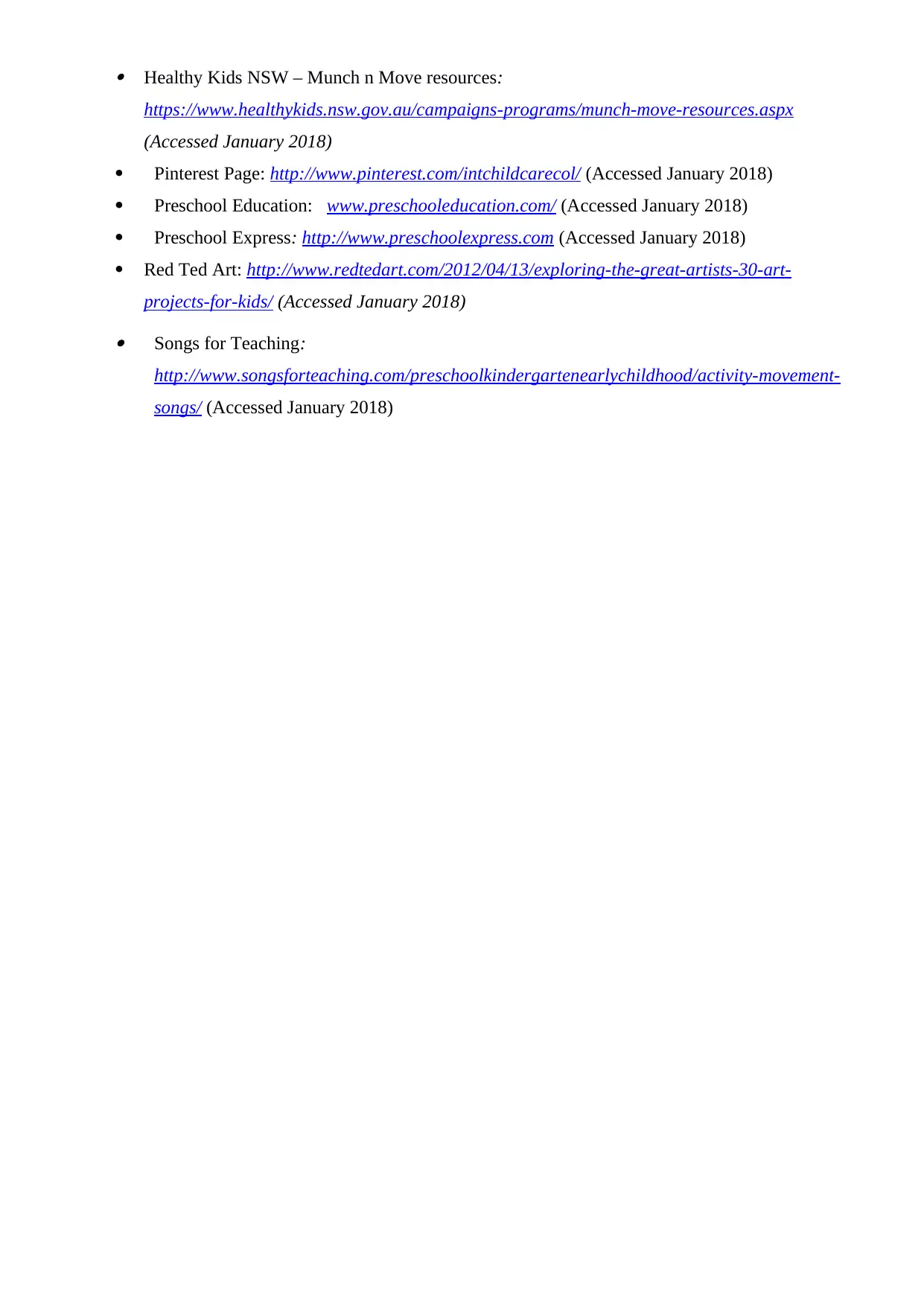
Healthy Kids NSW – Munch n Move resources:
https://www.healthykids.nsw.gov.au/campaigns-programs/munch-move-resources.aspx
(Accessed January 2018)
Pinterest Page: http://www.pinterest.com/intchildcarecol/ (Accessed January 2018)
Preschool Education: www.preschooleducation.com/ (Accessed January 2018)
Preschool Express: http://www.preschoolexpress.com (Accessed January 2018)
Red Ted Art: http://www.redtedart.com/2012/04/13/exploring-the-great-artists-30-art-
projects-for-kids/ (Accessed January 2018)
Songs for Teaching:
http://www.songsforteaching.com/preschoolkindergartenearlychildhood/activity-movement-
songs/ (Accessed January 2018)
https://www.healthykids.nsw.gov.au/campaigns-programs/munch-move-resources.aspx
(Accessed January 2018)
Pinterest Page: http://www.pinterest.com/intchildcarecol/ (Accessed January 2018)
Preschool Education: www.preschooleducation.com/ (Accessed January 2018)
Preschool Express: http://www.preschoolexpress.com (Accessed January 2018)
Red Ted Art: http://www.redtedart.com/2012/04/13/exploring-the-great-artists-30-art-
projects-for-kids/ (Accessed January 2018)
Songs for Teaching:
http://www.songsforteaching.com/preschoolkindergartenearlychildhood/activity-movement-
songs/ (Accessed January 2018)
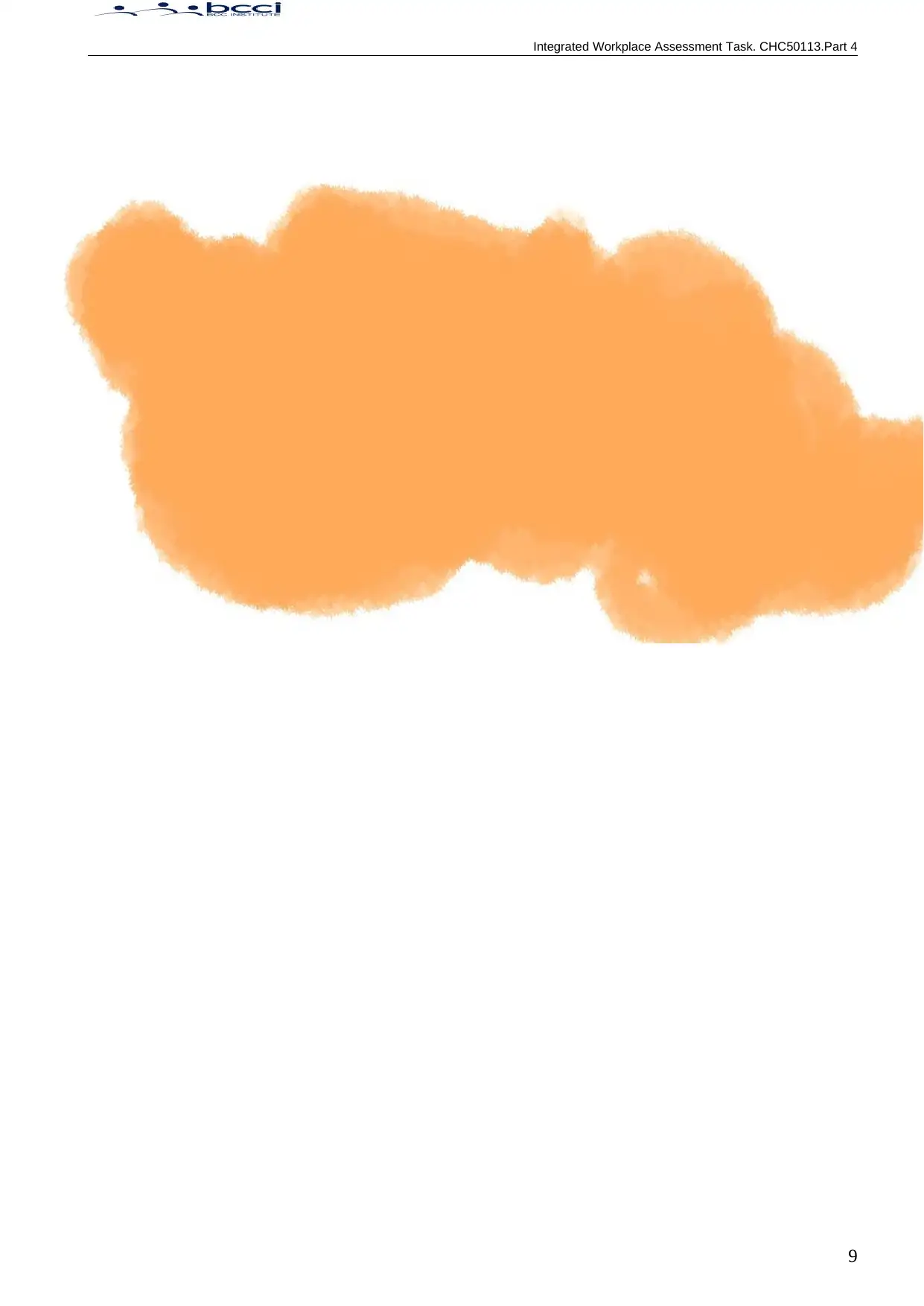
Integrated Workplace Assessment Task. CHC50113.Part 4
9
9
⊘ This is a preview!⊘
Do you want full access?
Subscribe today to unlock all pages.

Trusted by 1+ million students worldwide
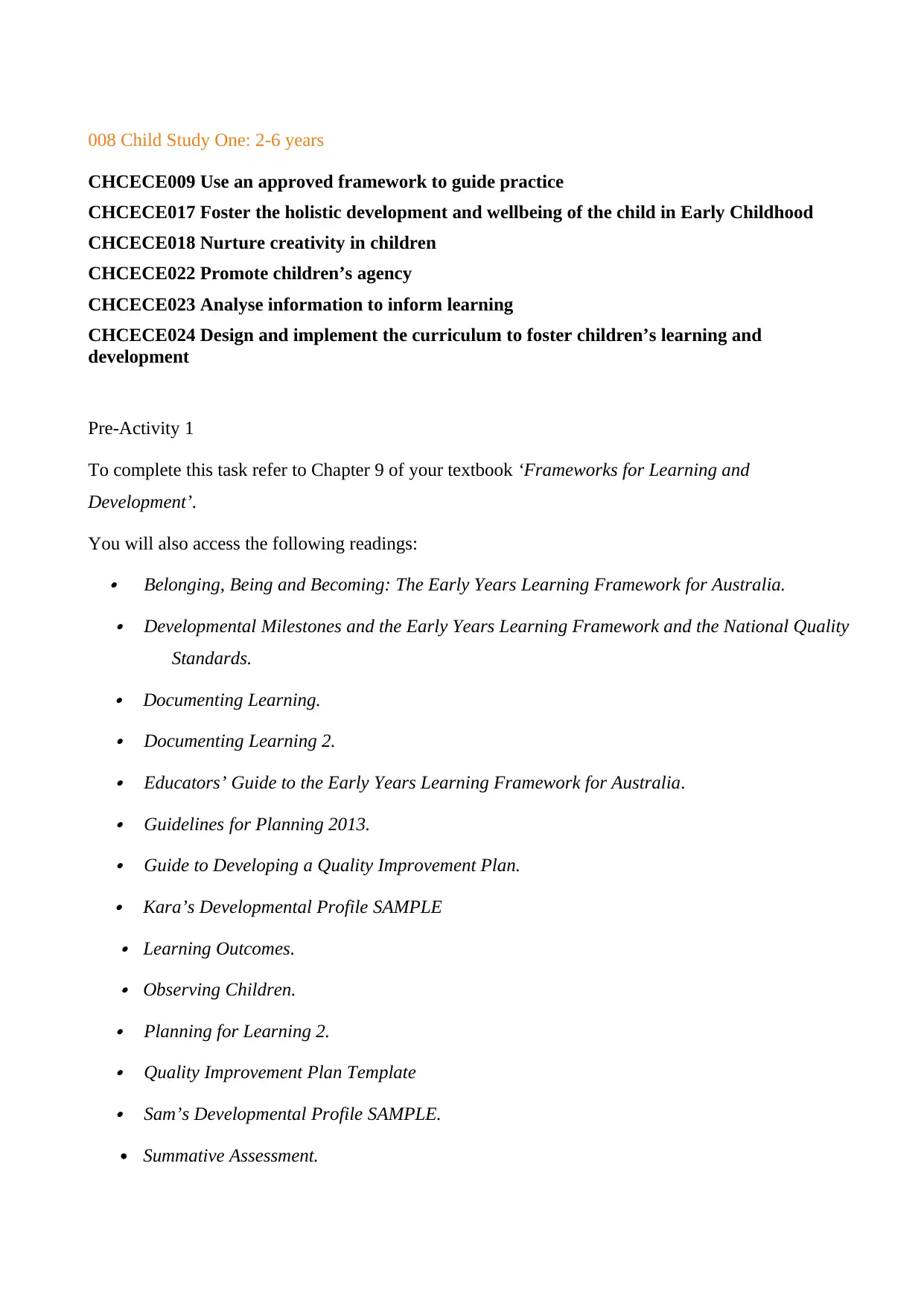
008 Child Study One: 2-6 years
CHCECE009 Use an approved framework to guide practice
CHCECE017 Foster the holistic development and wellbeing of the child in Early Childhood
CHCECE018 Nurture creativity in children
CHCECE022 Promote children’s agency
CHCECE023 Analyse information to inform learning
CHCECE024 Design and implement the curriculum to foster children’s learning and
development
Pre-Activity 1
To complete this task refer to Chapter 9 of your textbook ‘Frameworks for Learning and
Development’.
You will also access the following readings:
Belonging, Being and Becoming: The Early Years Learning Framework for Australia.
Developmental Milestones and the Early Years Learning Framework and the National Quality
Standards.
Documenting Learning.
Documenting Learning 2.
Educators’ Guide to the Early Years Learning Framework for Australia.
Guidelines for Planning 2013.
Guide to Developing a Quality Improvement Plan.
Kara’s Developmental Profile SAMPLE Learning Outcomes. Observing Children.
Planning for Learning 2.
Quality Improvement Plan Template
Sam’s Developmental Profile SAMPLE.
Summative Assessment.
CHCECE009 Use an approved framework to guide practice
CHCECE017 Foster the holistic development and wellbeing of the child in Early Childhood
CHCECE018 Nurture creativity in children
CHCECE022 Promote children’s agency
CHCECE023 Analyse information to inform learning
CHCECE024 Design and implement the curriculum to foster children’s learning and
development
Pre-Activity 1
To complete this task refer to Chapter 9 of your textbook ‘Frameworks for Learning and
Development’.
You will also access the following readings:
Belonging, Being and Becoming: The Early Years Learning Framework for Australia.
Developmental Milestones and the Early Years Learning Framework and the National Quality
Standards.
Documenting Learning.
Documenting Learning 2.
Educators’ Guide to the Early Years Learning Framework for Australia.
Guidelines for Planning 2013.
Guide to Developing a Quality Improvement Plan.
Kara’s Developmental Profile SAMPLE Learning Outcomes. Observing Children.
Planning for Learning 2.
Quality Improvement Plan Template
Sam’s Developmental Profile SAMPLE.
Summative Assessment.
Paraphrase This Document
Need a fresh take? Get an instant paraphrase of this document with our AI Paraphraser
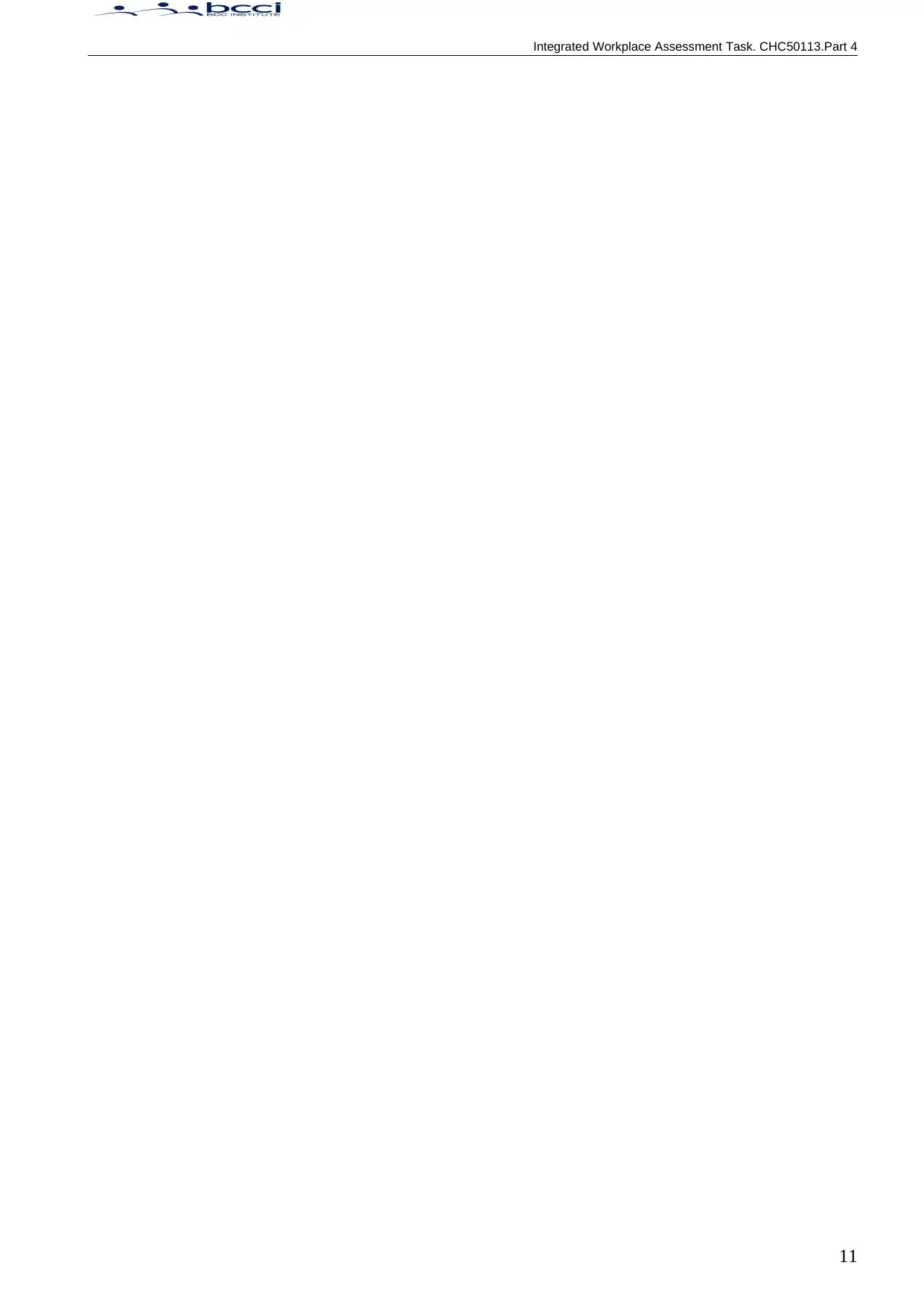
Integrated Workplace Assessment Task. CHC50113.Part 4
11
11
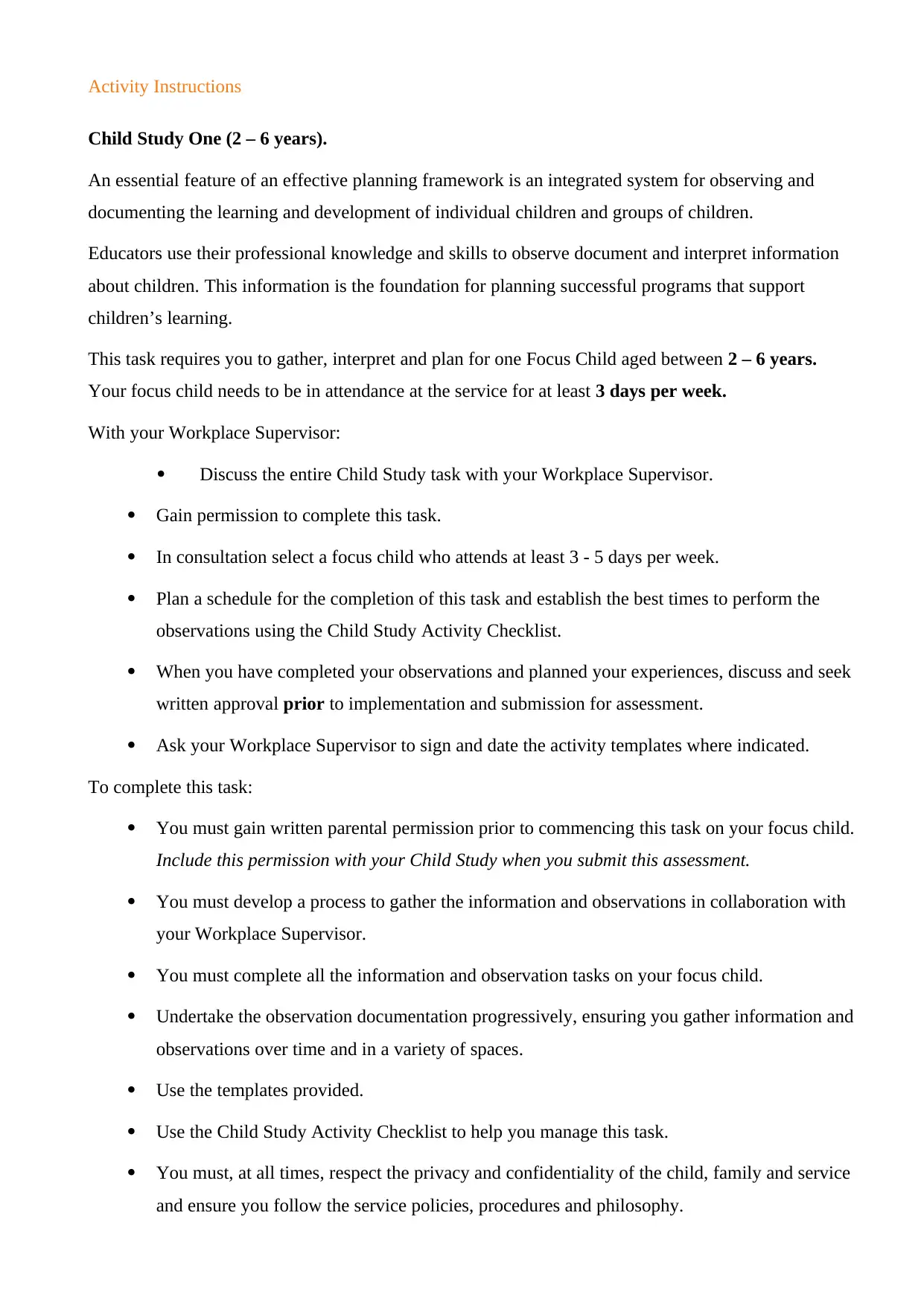
Activity Instructions
Child Study One (2 – 6 years).
An essential feature of an effective planning framework is an integrated system for observing and
documenting the learning and development of individual children and groups of children.
Educators use their professional knowledge and skills to observe document and interpret information
about children. This information is the foundation for planning successful programs that support
children’s learning.
This task requires you to gather, interpret and plan for one Focus Child aged between 2 – 6 years.
Your focus child needs to be in attendance at the service for at least 3 days per week.
With your Workplace Supervisor:
Discuss the entire Child Study task with your Workplace Supervisor.
Gain permission to complete this task.
In consultation select a focus child who attends at least 3 - 5 days per week.
Plan a schedule for the completion of this task and establish the best times to perform the
observations using the Child Study Activity Checklist.
When you have completed your observations and planned your experiences, discuss and seek
written approval prior to implementation and submission for assessment.
Ask your Workplace Supervisor to sign and date the activity templates where indicated.
To complete this task:
You must gain written parental permission prior to commencing this task on your focus child.
Include this permission with your Child Study when you submit this assessment.
You must develop a process to gather the information and observations in collaboration with
your Workplace Supervisor.
You must complete all the information and observation tasks on your focus child.
Undertake the observation documentation progressively, ensuring you gather information and
observations over time and in a variety of spaces.
Use the templates provided.
Use the Child Study Activity Checklist to help you manage this task.
You must, at all times, respect the privacy and confidentiality of the child, family and service
and ensure you follow the service policies, procedures and philosophy.
Child Study One (2 – 6 years).
An essential feature of an effective planning framework is an integrated system for observing and
documenting the learning and development of individual children and groups of children.
Educators use their professional knowledge and skills to observe document and interpret information
about children. This information is the foundation for planning successful programs that support
children’s learning.
This task requires you to gather, interpret and plan for one Focus Child aged between 2 – 6 years.
Your focus child needs to be in attendance at the service for at least 3 days per week.
With your Workplace Supervisor:
Discuss the entire Child Study task with your Workplace Supervisor.
Gain permission to complete this task.
In consultation select a focus child who attends at least 3 - 5 days per week.
Plan a schedule for the completion of this task and establish the best times to perform the
observations using the Child Study Activity Checklist.
When you have completed your observations and planned your experiences, discuss and seek
written approval prior to implementation and submission for assessment.
Ask your Workplace Supervisor to sign and date the activity templates where indicated.
To complete this task:
You must gain written parental permission prior to commencing this task on your focus child.
Include this permission with your Child Study when you submit this assessment.
You must develop a process to gather the information and observations in collaboration with
your Workplace Supervisor.
You must complete all the information and observation tasks on your focus child.
Undertake the observation documentation progressively, ensuring you gather information and
observations over time and in a variety of spaces.
Use the templates provided.
Use the Child Study Activity Checklist to help you manage this task.
You must, at all times, respect the privacy and confidentiality of the child, family and service
and ensure you follow the service policies, procedures and philosophy.
⊘ This is a preview!⊘
Do you want full access?
Subscribe today to unlock all pages.

Trusted by 1+ million students worldwide
1 out of 161
Related Documents
Your All-in-One AI-Powered Toolkit for Academic Success.
+13062052269
info@desklib.com
Available 24*7 on WhatsApp / Email
![[object Object]](/_next/static/media/star-bottom.7253800d.svg)
Unlock your academic potential
Copyright © 2020–2026 A2Z Services. All Rights Reserved. Developed and managed by ZUCOL.




